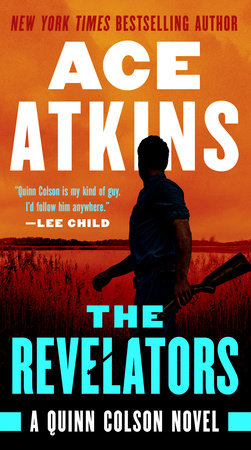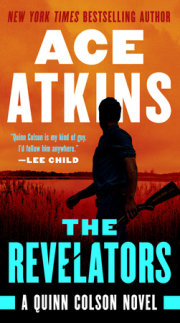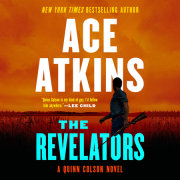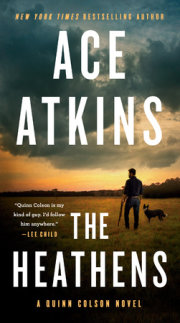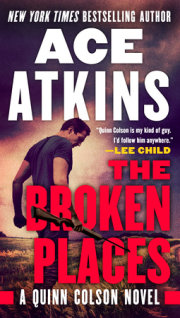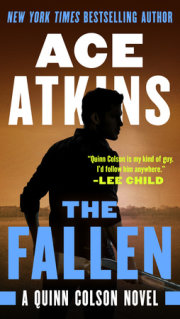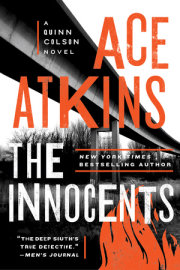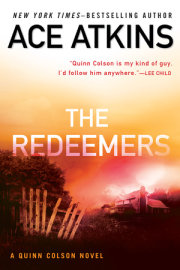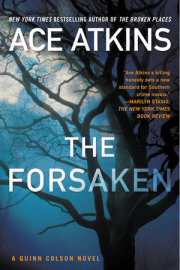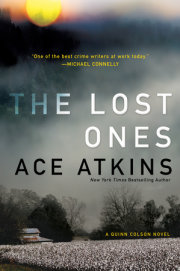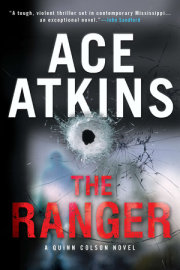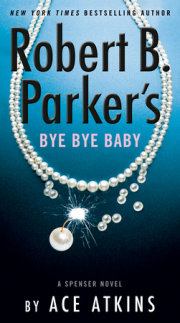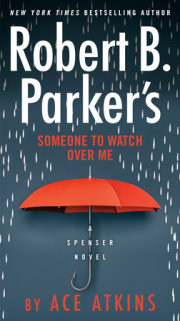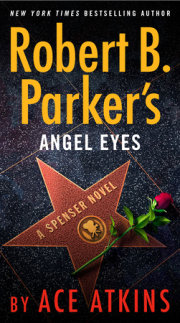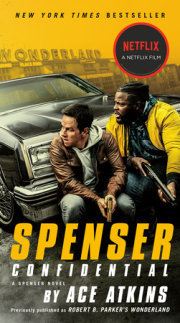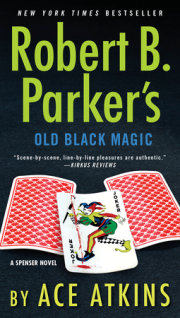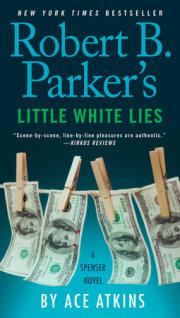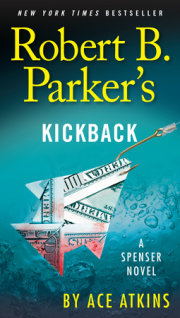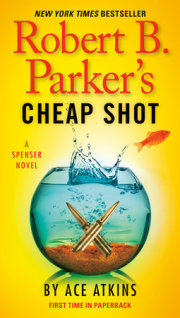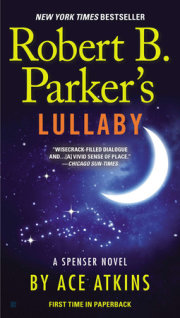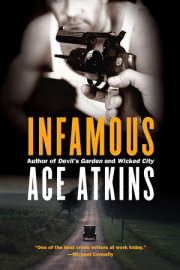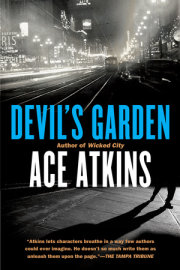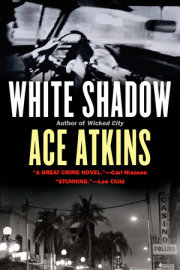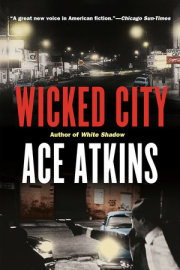1
Ten months after the shooting out on Perfect Circle Road, a twelve-year-old girl named Ana Gabriel walked in the ninety-five-degree August heat with her little brother Sancho. Sancho was only nine and knew nothing about politics or corruption in Tibbehah County, only that their mother hadn't shown up to drive them home on their first day of school and he was upset. It frustrated him even further that Ana Gabriel had decided they'd better walk than wait, Sancho questioning all that was good and holy, a full four miles back to the Frog Pond Trailer Park, where so many of the Mexican and Guatemalan families had settled. They were very tired and sweaty, cutting through a thicket of pines and down through a kudzu ravine that hugged the highway.
"I knew this day would come," Sancho said. "The Rapture. Just like the movies from church. Angels blowing trumpets. People being whisked into the clouds to meet Jesus, even those in airplanes or sitting on toilets. He has taken all the good people and left the sullen and the wicked behind. Every story must end, Ana Gabriel. We know as much. Now it is time for the human race."
"Would you please shut up?" Ana Gabriel Hernandez-Ramirez said, walking beside her little brother. "Mam‡ has a reason. She is still at work. Maybe she had to go to the market to buy eggs, cheese, and milk. Perhaps even had engine trouble. Her car. You know that car. So many troubles."
"Then why won't she answer her phone?" Sancho asked, wide face shining with sweat, trudging alongside her, short legs trying to keep up. "We have called her twenty times."
An odd August stillness fell over the Frog Pond Trailer Park on the outskirts of Jericho, Mississippi. Ana Gabriel had never heard it so quiet or seen it so empty, draped in an odd dusky gold light, the heat radiating up from the ground. Sancho followed her into the little maze that took them to the far corner of the park to the white single-wide they rented by the week.
"Our family left us," Sancho said. "Again."
"They would never leave us," Ana Gabriel said. "They love us very much. Take that back or I will punch you very hard in the head."
"Then it is the Rapture," he said, excited. "We have to find the others, start deciding who is in charge. I would like to be the mayor of the city. Or perhaps the president of the United States. I would also like my own very large truck. One with big silver wheels and a winch. I like GMC but would settle for a Chevy if we find one with the keys in it."
"You're only nine."
"Does it matter now?" he said. "Now that we are the only ones left? All of it so very sad. The bad children who didn't mind their parents or eat all their dinner. Ana Gabriel, we haven't been to church in at least three Sundays. Think of the shame."
"This is something else," she said. "Two girls I know were brought to the principal's office and never returned. You yourself said you saw Tomas in the lunchroom, crying along with his uncle. I don't like where any of this is headed."
"Mam‡ forgot us."
"Mam‡ never forgets," Ana Gabriel said. Her mind already turning over a hundred different possibilities of what might have happened. All of them bad. "She works hard. She works late. You know this. It's a new job. She has responsibilities. So many chickens to clean and pull out their insides. Why do you always worry? Why do you always think the worst?"
"That's my job," Sancho said. "I am the man. The head of the household. Our uncle Chuy told me as much over the summer. C'mon. We need to start gathering wood for the fire."
"It's ninety-five degrees," Ana Gabriel said. "Why would we need a fire?"
"Anytime anyone is lost or left behind, they build a fire. Don't you pay attention to what we've seen on The Walking Dead?"
The journey to the Frog Pond hadn't been so bad, pushing through the woods, rows and rows of skinny pine trees planted as neatly as crops of corn, the August sun shining down through the branches and onto the copper-colored needles at their feet. Sancho was as wide as he was tall, hoisting his heavy Spider-Man backpack across his shoulders. His face round, with black hair cut still and straight with their mother's scissors. Ana Gabriel stood a head taller but didn't let her mother touch her hair, letting it grow straight, long, shiny, and black down to her backside.
Today, she'd tied it in a neat purple ribbon, freshly combed for the first day of school. If only she hadn't had to sweat through her new linen shirt embroidered with red roses or dirtied her jeans from Walmart, covered full of brambles and cockleburs.
"If you're so smart," Sancho said, "you tell me where is everyone? Where has everyone gone?"
Sancho was right. The Frog Pond park was filled with a quiet so complete, she could hear the wind cutting through the spaces between the old rusted trailers. A loose door slamming over and over against the jamb. She looked down at her new Reeboks, bright white and perfect this morning, now covered in a fine brown dust.
"I bet everyone is on the Square, getting ice cream and milk shakes at Sonic," she said. "Or buying new shoes."
"My shoes are old," Sancho said. "They have the name Bobby written inside with marker and smell like sweaty socks. Who was this Bobby? Why did he smell so bad?"
"We are grateful for what we have."
"You are grateful for that silver bracelet," he said. "The one your boyfriend gave you."
She felt her face flush. "He's not my boyfriend."
"Then why do you sit with him at church and walk with him for Sunday dinner?" Sancho said. "I even saw you holding his hand maybe six times this summer. The boy with the light brown skin and bright blue eyes. Jason Colson. I know his name. You've already written it in pink marker."
Ana Gabriel moved her hands over her backpack, biting her lower lip. "Shut up," she said. "Shut up. Shut up. Shut up."
"Saying it so many times only proves what I say," Sancho said. "I hope he was a bad kid, maybe one who cheats and steals, for your sake, and that he wasn't taken up to heaven in a golden light. That way you and him might kiss and warm yourself by the fire."
She was about to whack Sancho on the back of his head with her book bag when they spotted the other children gathering in the center of the trailer park. Maybe eight, nine of them, some of them crying. One boy sitting on the wooden steps of his trailer, his head in his hands. They were all The Others, the new ones to Tibbehah County. The Mexicans. The Guatemalans. The Hondurans. All different, although most of the children had been born here. They were supposed to be Americans, but few seemed to agree.
After ten different schools in twelve years, Ana Gabriel had moved across much of Texas and Alabama and then Georgia. Their last home had been in a very old apartment complex on Buford Highway in Atlanta, barely seeing their father, who worked every day in construction, doing the jobs that no sane person would want. Lathering tar on roofs, connecting tubes under old houses. He was still there, or so she thought, sending them money every few weeks even though he had a new wife and family. Their mother had taken a job at a poultry processing plant in Tibbehah.
A place that smelled so horrible, her mother would strip and shower after work every day, letting her clothes soak in bleach.
Little dust devils turned and kicked up in a hot summer wind between Ana Gabriel and her brother. She looked over at Sancho, and he gave her a smug, self-knowing smile.
"What?" Ana Gabriel said, approaching the other children. "What is it?"
"They've taken them," a boy about her age said. She'd seen him only once, maybe twice, at The River, getting supplies. His name was Armando and his father had been the one who'd offered the processing plant job to her mother. Hector, his father, acting as a go-between, often gathered workers at the trailer park, telling them what he'd heard from the plant owners, letting them know their rights when there was trouble.
"Who?"
"Our parents," Armando said. "They are all gone."
Although it hadnÕt quite been a year since the shooting, Quinn felt like his recovery had gone on forever. Draining and bandaging the wounds, getting up slow and easy to his feet, learning to walk again, taking weeks and months off from the Tibbehah County SheriffÕs Office. If it hadnÕt been for his wife Maggie, heÕd probably still be in the hospital or gone insane. She made him walk, drove him to rehab, looked after his medication and nutrition. No fatty foods. Almost no alcohol and limited coffee. Damn, how Quinn loved coffee.
"Maggie sees you smoking that cigar, she's gonna have your ass," Boom said.
"You gonna tell her?" Quinn said.
"Nope."
"Wasn't I told to resume normal activities?"
"Is drinking and smoking at four in the afternoon normal?"
Quinn shrugged and blew a smoke ring. "Is now."
Quinn and Maggie and his adopted son Brandon lived on a fifty-acre parcel of land near a hamlet called Fate. The house was white and tin-roofed, a classic old L-shaped farmhouse built more than a hundred twenty years ago by his great-grandfather, an austere, big-bearded Methodist preacher by the name of William "Big Bill" Beckett. Quinn had barely left the land the last few months, taking walks on the trails in and around the property, at first moving slowly up to the pond, taking nearly thirty minutes for what used to be a five-minute trip. Over the summer he'd taken to fishing, welcoming his old deputy Lillie Virgil and Special Agent Jon Holliday. Boom came over nearly every day, sitting with Quinn until the sun went down.
Quinn was a tall white man, thinner than normal, with a sharp profile and close-cropped dark hair. Some folks told him he had "flinty eyes" and he wasn't sure whether that was a compliment or an insult. His best friend Boom was black and much larger, six-six and two-sixty, with only one arm. His right arm had been blown off while delivering a tanker of water to Fallujah. Boom had been in the Mississippi National Guard and Quinn in the 3rd Battalion of the 75th Ranger Regiment. They'd known each other since they were five years old.
"What bothers me most about this new sheriff is his attitude," Boom said. "Man's cocky as hell. Sure loves telling folks that he'd gone to Vanderbilt and served as a captain in Afghanistan."
"Even wrote a book about it," Quinn said. "I heard they're selling it at the Jericho Farm and Ranch for nineteen ninety-five. Honor and Duty."
"I wouldn't wipe my ass with that shit," Boom said. "Most folks saw more action playing Call of Duty."
Quinn shrugged. "Governor Vardaman calls him an American hero," he said. "Just the kind of man Tibbehah County needs to clean up the filth and corruption of such a wicked county."
"You trying to get me to start drinking again?"
The sun hadn't even thought about setting yet. Quinn reached for the bottle and refilled his coffee mug. Boom didn't touch the bottle, again on a long period of abstinence from booze. Booze and Boom never mixed well.
"No, sir."
"Then let's not talk about Vardaman," Boom said. "Not now. Not after all that man's done."
"You don't believe he wants to see a clean and corruption-free state?" Quinn said.
"No more than a hog wants to see his crib free of mud and slop," Boom said. "You want to see exactly what's going on? How about me and you go riding tonight and I'll show you just how much that son of a bitch has cleaned up."
Quinn drank some whiskey, feeling the hot bourbon slide down his throat. Cicadas chattered high in the pines, a hot wind blowing through the big oak that shadowed his tin-roof porch. As Quinn took another pull of the Liga Privada, he spotted Maggie's green Subaru cross the old wooden bridge, kicking up dust and grit and pulling into the front yard.
"She gonna get your ass," Boom said.
"That woman loves me."
"I know she do," Boom said. "That's why she wants you whole."
Quinn set down the cigar on the edge of an empty coffee can. He would've stood up if he could, still exhausted from his mile walk that morning. Hondo raised his head and got to his feet and stretched before running out to meet Maggie and Brandon. Maggie, still dressed in navy scrubs and carrying cloth grocery sacks, made her way up onto the porch. Boom met her, hooked a few bags with his prosthetic arm, and headed into the old house. Brandon, towheaded and skinny in khaki shorts and an Adventure Time T-shirt, had run off into the back field with Hondo, tossing a stick toward the pecan trees.
"Lousy job getting rid of evidence," Maggie said, waving her hand through the dissipating smoke cloud.
"Would it have made any difference?" Quinn asked.
"Nope," Maggie said. "You've been sneaking cigars for the last month."
"Never smoke around you."
Quinn grinned, tapped the ash of the cigar, and carefully edged out the burn. Maggie took a seat on the old porch swing and stretched out her long legs, hair wrapped up in a messy bun on top of her head. She lay her hands over her expanding stomach and looked down to it, cutting her eyes over at Quinn.
"She's been active today," she said. "Kicking and punching my ribs."
"She's going to be tough."
"Damn straight, Ranger."
"Gets it from both sides."
Maggie nodded, lifting her eyes to Quinn. She tilted her head and pushed some stray hair off the nape of her neck. "You think you might slow down a little tonight?"
"Boom wants to get me out tonight, go low riding on some country roads like we used to," Quinn said. "Cool out. Take in some sights."
"I know what he wants to show you," Maggie said. "You really think that's a good idea?"
Quinn didn't answer, reaching for the coffee mug and finishing what was left, not sure if Maggie knew it wasn't coffee. He stretched his legs out and looked out into the cow pasture across the road, dozens of cattle huddled under a well-worn oak, seeking shade from the heat. They were beautiful to watch. Red Angus, brought over from Texas by his father back when he'd been living in a trailer in the back field. Quinn hadn't heard from Jason Colson now for almost three years. Even after he'd been shot and it had made national news.
Copyright © 2020 by Ace Atkins. All rights reserved. No part of this excerpt may be reproduced or reprinted without permission in writing from the publisher.

